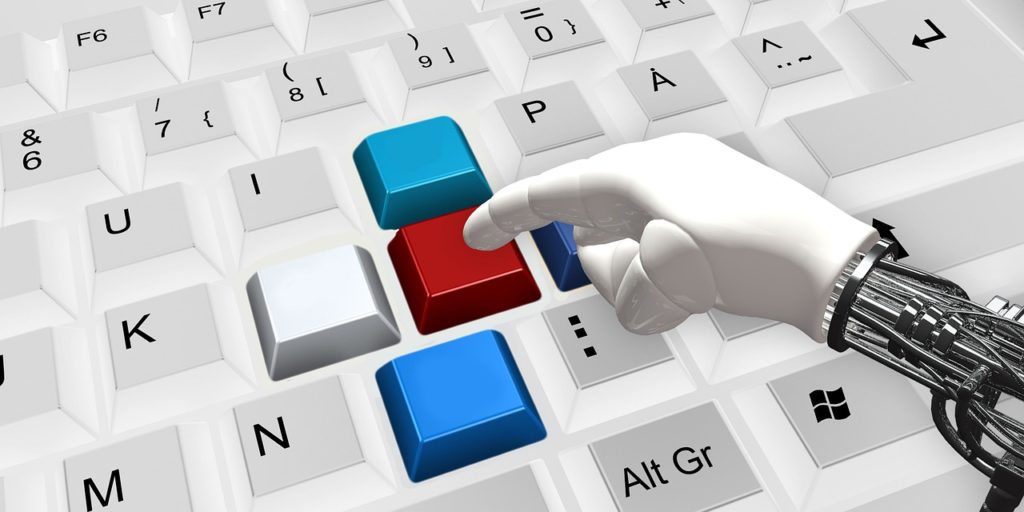- Trademarks Act not meant to protect Canadian sensibilities - April 25, 2024
- U.S. lawmakers tee up copyright protection for golf courses - March 6, 2024
- Remain vigilant over your licensees in trademark agreements - January 22, 2024
By Tony Poland, LegalMatters Staff • With the ever-expanding role of artificial intelligence (AI) in the creative process, Canada’s laws will need to be amended to define and protect intellectual property rights, says Toronto intellectual property lawyer John Simpson.
AI has been around for decades and has developed into a formidable tool with increasing applications, says Simpson, principal of IP boutique Shift Law Professional Corporation.
“Artificial intelligence is not new. Arguably Google is a form of AI. It is the specific creative capabilities of the technology that are new,” he says. “Up to this point, we have been using AI for predictive-type purposes, but now it is able to actually create content that is much like human creation. What we need to ask is, ‘Are AI-created works entitled to the same type of protection as human-created works and, if so, who benefits?’
“As more and more musical creations, commercial advertising creations and even literary and cinematic creations are generated with the assistance of artificial intelligence, to the point where it is involved in most of the process, we are going to need a legislative response,” Simpson tells LegalMattersCanada.ca. “We will need new legislation to address the question of property rights.”
He says all intellectual property rights issues are based on policy considerations.
Creators are rewarded for new innovations
“One of the policy considerations that influences copyright, patent and trademark law is creating incentives to developers or inventors to produce new innovations by rewarding them with exclusive rights once they do. That benefits society,” Simpson explains. “That is why the law creates protections.”
The creators of AI are rewarded with intellectual property protection through patents and through copyright in source code, he says.
“Historically, artificial intelligence has been a tool for creation and not a creator itself. That is the way the law has been treating it to this point,” says Simpson.
However, the technology has advanced to the point where AI tools can create work with limited or no human intervention, leaving the questions of whether there should be intellectual property rights in those creations and who should enjoy them, he says.
“Should we be extending protection to the creations of artificial intelligence?” Simpson asks. “That is a policy question. As a matter of policy based on the way the law presently works, I believe that would be overextending the exclusive rights that creators of AI should be entitled to.
The technology typically not used to create things ‘out of the blue’
“One reason for that is creators of the AI technology itself are already rewarded with intellectual property rights. Another is that the technology is typically used not to create things out of the blue but as tools for creators to develop something they can edit, which would then be a human creation,” he adds.
As a creative tool, Simpson compares AI to software such as MS Word.
“Software with spell check and predictive text features have some degree of AI but we would never think of giving Microsoft the copyright to works that are created using MS Word,” he says. “We need to ask, ‘Is there a point at which the AI becomes more than just a tool used by humans to create works and should be thought of as the creator itself?’
- Court decision brings trademark law back in sync
- What’s in a name? In trademark law it can depend on how it is used
- Realtor up in arms about copycat ad, but does he have an IP claim?
Another interesting consideration is who owns the rights to the “raw material used to inform the AI,” he says.
“For instance, say I want to create an image to advertise my product and I give instructions to an AI tool that goes out and finds something that already exists that a human created,” says Simpson. “AI tweaks it a bit and presents it to me and I love it. Am I infringing that first person’s intellectual property?
“The terms of use in AI software address that to some extent,” he adds. “They typically state that the creator of the AI tool is not liable for any infringement of third-party intellectual property. Otherwise, they would be exposing themselves to potential liability.
AI is seen as a tool more than the creator
Simpson says up to this point, artificial intelligence has generally been seen “as a tool more than it is as a creator and that the makers of AI and software companies build that assumption into their terms of use.”
However, as more works are being created primarily by artificial intelligence, there will need to be laws to deal with the changing landscape, he says.
“If I am a creator and AI is using my work to inform its algorithm to help other people create their works, am I not entitled to some compensation? And who do I seek it from – the AI itself or the people who are using it?” Simpson asks. “There are a number of intellectual property questions that arise. And like all intellectual property questions, the best way to resolve that is through legislation that is based on policy considerations.
“In the coming years, I expect new laws and amendments to the Copyright Act that specifically address the use of AI in creating works.”

